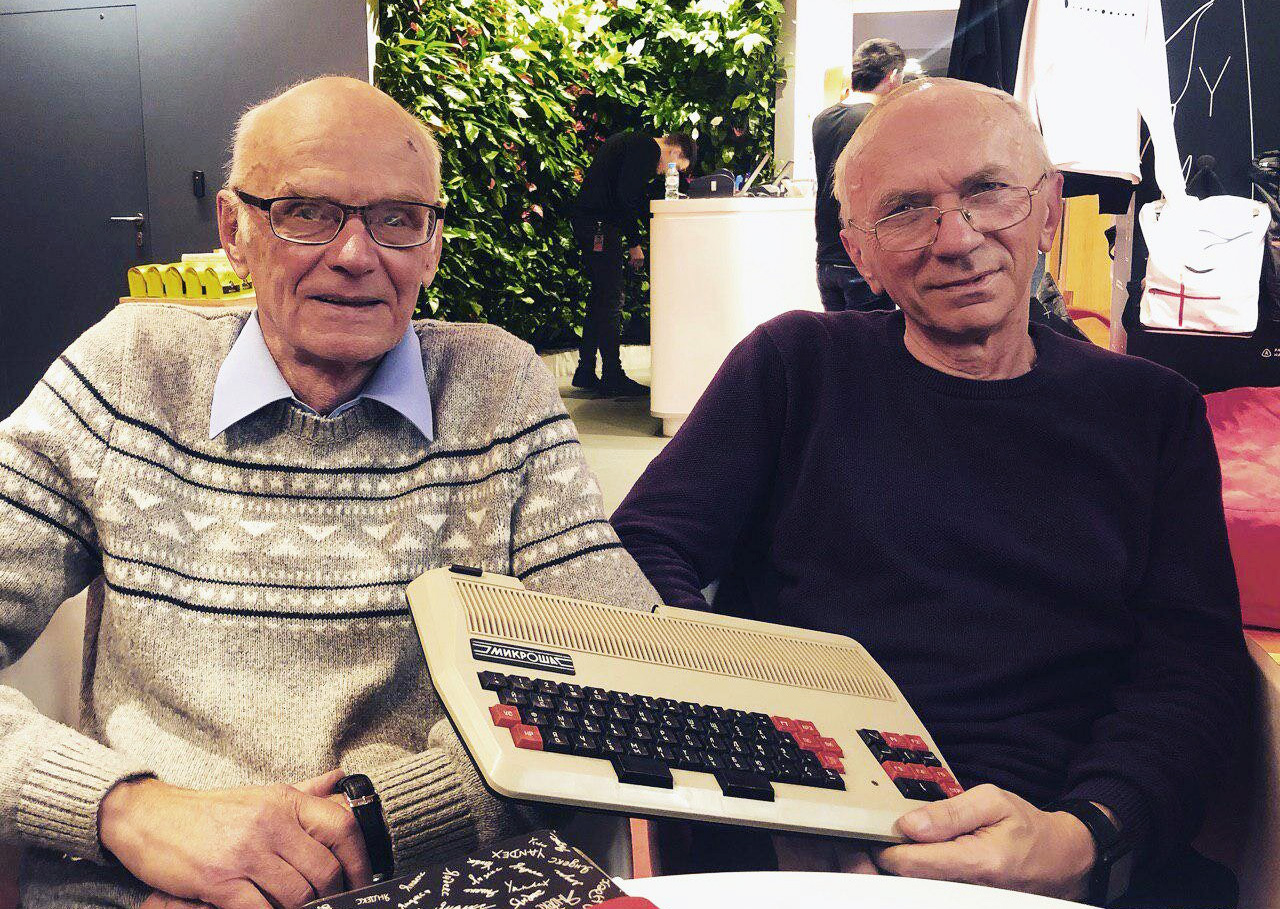
Recently, the Yandex Museum was visited by co-authors of this series of articles and the creators of the Micro-80, Radio-86RK and Mikrosh computers - Gennady Vadimovich Zelenko and Sergey Nikolayevich Popov SNPopov . We wrote down for Habr the stories that they told. At the end of the post, you can watch a video of the meeting.
- Fifties and sixties
- Seventies
Nixon and lazy engineers
The processor, which was almost thrown out
How the language of Basic fell into the hands of Gennady Zelenko and Sergey Popov - Eighties
30 liters of alcohol and a personal pension
Drawings without a sample and the perfect typist
"Portrait" of Academician Aleksandrov
Industrial Letters
Saved marriage
Exhibition in Leipzig
Bucket of chips - Nineties
- Video meetings and Q & A sessions
Fifties and sixties
Gennady Zelenko:
First of all, we want to thank the young guys who remembered and remember us and the history of computer technology. When we discussed the meeting plan at the Yandex Museum, a question suddenly arose (not with us, of course, among the young): how did you work? .. We realized that the word “worked” meant - a long time ago and in the Soviet Union. The answer is that it worked fine. But this is too short an answer.Our journey into the world of electronics began as a hobby, with detector receivers. In my case, it was the end of the forties - the beginning of the fifties. On the one hand, the technology was not so advanced then that you could create something from the details. On the other hand, already assembled devices in stores either were very expensive or were not sold. When electronic lamps appeared, it was a powerful incentive to start doing something. And we started.
Sergey Popov:
My path to electronics began later, and it began with a crime. Now you can tell, the statute of limitations has expired. It was the mid-sixties. I also tried to make a detector receiver. I had everything I needed: a drive, a diode, an earphone. There wasn’t enough item on which I could wind the receiver coil. So I sawed off a piece from my father’s shovel. Father then for a long time was surprised that the shovel had become somehow short. To collect the receiver seemed unspeakable joy. I was then 12 years old.What do you think, when the first minicomputer was produced, in which year and in which country?
Correct answer
In 1963, in Leningrad, Soviet engineers Alfred Sarant (passport Philip Georgievich Staros) and Joel Barr (Joseph Veniaminovich Berg) assembled the UM1-NX - "Control Machine for the National Economy," the world's first mini-computer. Double names are related to the fact that they used to be scouts. UM1-HX worked for a long time - back in the mid-90s, such a computer was in the Severstal rental workshop and managed the rental.
Seventies
Nixon and lazy engineers
Gennady Zelenko:
In 1972, President Nixon came to the USSR, they kissed Brezhnev, and Nixon allowed — and it was most strictly forbidden — to sell modern American equipment for the production of microcircuits to the Soviet Union. It arrived in Zelenograd and in Kiev, in the NGO Crystal. Ours then were able to start making normal microcircuits.A bit of history. Intel is lazy engineers who, as always, do what they need. Once they received an order for a ridiculous amount of 50 thousand dollars. They had to make four different specialized calculators. But they are lazy engineers. They said - why do we need four, we will make one universal, then here we re-solder, then reprogram, and get four. In America, they are now considered the most-most, their names are written on the monuments. They did it, and the leadership of Intel saw a sign in their work that something could be done so that later the consumer would remake it for himself. So the first completely stupid microcontrollers appeared. In 80, Intel 8080 came out, and in the 78th, Intel 8086. It could still be done on the equipment that Nixon allowed to sell, and then everything, our microelectronics seemed to have stopped safely.
By the way, Motorola made its first processor only two to three months later than the 8086. Motorola 68000, as they wrote, was much better. But firstly, they were two or three months late, and secondly, Intel was so cunning that it came up with suppliers from Japan and Germany. Therefore, any designer doubted - suddenly Motorola go broke? There was no such fear with Intel, their partners would continue production. Therefore, people often chose Intel. To develop is only half the battle.

Intel i8080 and the Soviet counterpart - KR580VM80A. Photo: Konstantin Lanzet, CPU collection Konstantin Lanzet, commons.wikimedia.org
If you go back to the Intel 8080, ours immediately torn it up. It’s almost no slang, unless it’s right to say - to scrub. Layer by layer, the microcircuit is peeled off, photographed, appropriate masks are made. There is equipment for production (thanks to Nixon), there are masks, then you can reproduce this scheme without even understanding how it works. And in the mid-seventies, a microprocessor with the strange name MPK-25 appeared. Under this name, he existed for two years, such is the first appearance of this elemental base. Guess why MPK-25?
Correct answer
Microprocessor for the XXV Congress
The processor, which was almost thrown out
I then considered electronics as a hobby or as a second job, part-time. My specialty was another, related to optics (I graduated from the Bauman Institute). But in 1975 in the library I came across the translated journal Electronics. Translations usually came out two to three months after the originals. On the cover was written - "microprocessor." I did not know what it was, but when I saw this word, I realized - this is mine. I read this magazine to the holes and began to look for how to escape from the rocket and space company, in which I worked on distribution, and deal specifically with microprocessors.
The developers of the equipment at the institutes of the Soviet Union had at the end of each year to make lists of the parts that they would need next year. We sat and composed. Usually, the first half of the list indicated what was really necessary, and the second was composed on the principle of “what the soul asks for.” For example, I once ordered an engine for a tape recorder - no one paid attention to such orders. The strangest thing is that all the parcels arrived. And after Electronics magazine, I wrote on the list to bring the Intel 8080 microprocessor. Then I quit this organization, six months later I walk down the street and suddenly I meet a former colleague. She says: “Listen, you ordered something there. Take it, otherwise I’ll throw everything away. ” I came, saw a beautiful box, there was a great application manual and about five chips.
How the language of Basic fell into the hands of Gennady Zelenko and Sergey Popov
Based on the 8080 processor, many in the West began to sculpt small cars, devices. Then everything was decided to publish, including code. We easily assembled the monitor according to the instructions from a magazine (possibly from Byte magazine). A monitor is not at all what you thought. At IBM, the BIOS became an analogue of the monitor. This is a certain (at that time tiny) program that allowed you to revive your set of parts so that it communicates with external devices.
The monitor we assembled was universal. So universal that the first Basic language appeared that worked under this monitor.
Now almost no one remembers that in Sokolniki in those years, they organized various international exhibitions devoted to technical things. People came to us from abroad, showed products, microcircuits, feeling that the Soviet Union would become a new market for them. And so, once we visited the American pavilion or stand, we borrowed two rolls of punched tape from there. Very reliable carrier.
We had a programmer Marina, she distracted the Americans, and we "borrowed". Then we dragged the rolls to ourselves in MIEM , and since the monitor we assembled was universal, and not from any machine, we stuck this punched tape and it started to work. True, the Americans ruined the first two teams so that nothing would start so easily. Marina guessed what exactly to fix, and it all worked - go to appeared on the screen. We thought that it means "Fuck you." They looked at her for several days and did not know what to do next.
The most interesting thing: two days after we borrowed the punched tape, our peer appears at the department, says - I was near the stand, saw everything, let's share - and takes out the KGB crust. We began to share, gave him something, he gave us something. Neither he nor we knew what Basic was hiding inside. The tapes were intended primarily to play electronic games. On the first tape was a game about the governor of a communist island, on the other - about landing on the moon (it was necessary to land the lunar module).
Since the transitions in the interpreter were changed, the game started immediately, without an invitation on the screen. We got to the hidden inside Basic only then - we guessed that the interpreter was working. He always sits in memory and interprets each command. It turns out that in each roll the main part was occupied by the interpreter, and a little - a toy.
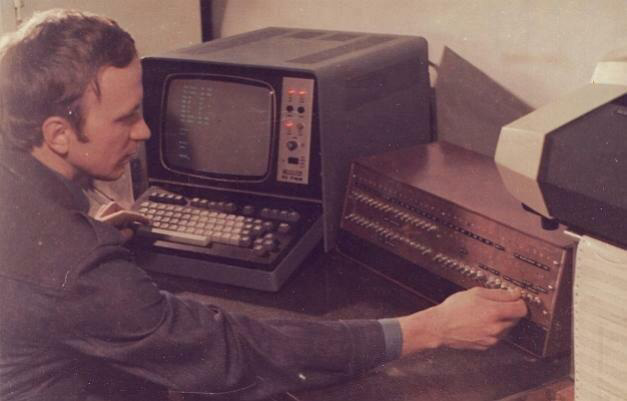
Sergey Popov
Eighties
30 liters of alcohol and a personal pension
The state of the field of radio electronics in the USSR was aggravated by the fact that just party members who had worked in this industry for a long time stood at the head of the Ministry of Radio Industry. For example, for some time the deputy minister was Nikolai Vasilyevich Gorshkov, who had once worked for a long time in the electronics industry, but was only the head of the tool shop and, of course, did not understand anything in electronics.
The son of Nikolai Vasilievich worked in our department, we invited his father to show him one of our computers, they told us everything about him. He was very skeptical. Took me by the shoulder and says:
“You guys are doing nonsense.” Do you even know what a computer is? This is a hundred square meters of premises, 30-50 people of service personnel, 30 liters of alcohol for flushing contacts and megawatts of electricity per month. This is a computer. He cannot be personal and never will be. Personal is a car, cottage, pension. A personal computer is nonsense.
Deputy Minister of Industry. And there's nothing to be done. It is good that we did not obey him.
Drawings without a sample and the perfect typist
On Kirova Street (now Myasnitskaya) there was a sign - Radio magazine. The circulation is one and a half million copies. We decided to contact them. We were supported by the deputy chief editor by the name of Stepanov, a visionary man, as it seemed to us. For some reason, he grabbed onto our proposal, and we began this insane-sized series of publications.
It's funny that we didn’t collect the Micro-80 ourselves. Our pride is that we published schemes in the journal without checking them in the collection, then someone collected something according to these schemes, and strangely enough, everything worked.
At the institute, we used a machine similar to the Micro-80 to print horoscopes for interested executives. If you quietly press a button on the keyboard, the horoscope always turned out to be perfect, and everyone was happy. Plus, our two dissertations were published.
Sergey Popov:
When I brought my supervisor the printed dissertation, he pretended to leaf through it, and then said: “Where did you get such a typist? Look how she manages to align the right edge, what does she calculate and conduct? ”I had to tell what we are doing.The team that focused on building computers included Gennady Vadimovich, Victor Panov, programmer Marina and me. I was not quite a native member of the team. Everyone else graduated from the institute in this specialty, and I came a little later. Those with whom I had previously worked had about the same idea of computers as Deputy Minister Gorshkov. And I immediately thought that I really want such a thing home. Laziness is the engine of progress.
"Portrait" of Academician Aleksandrov
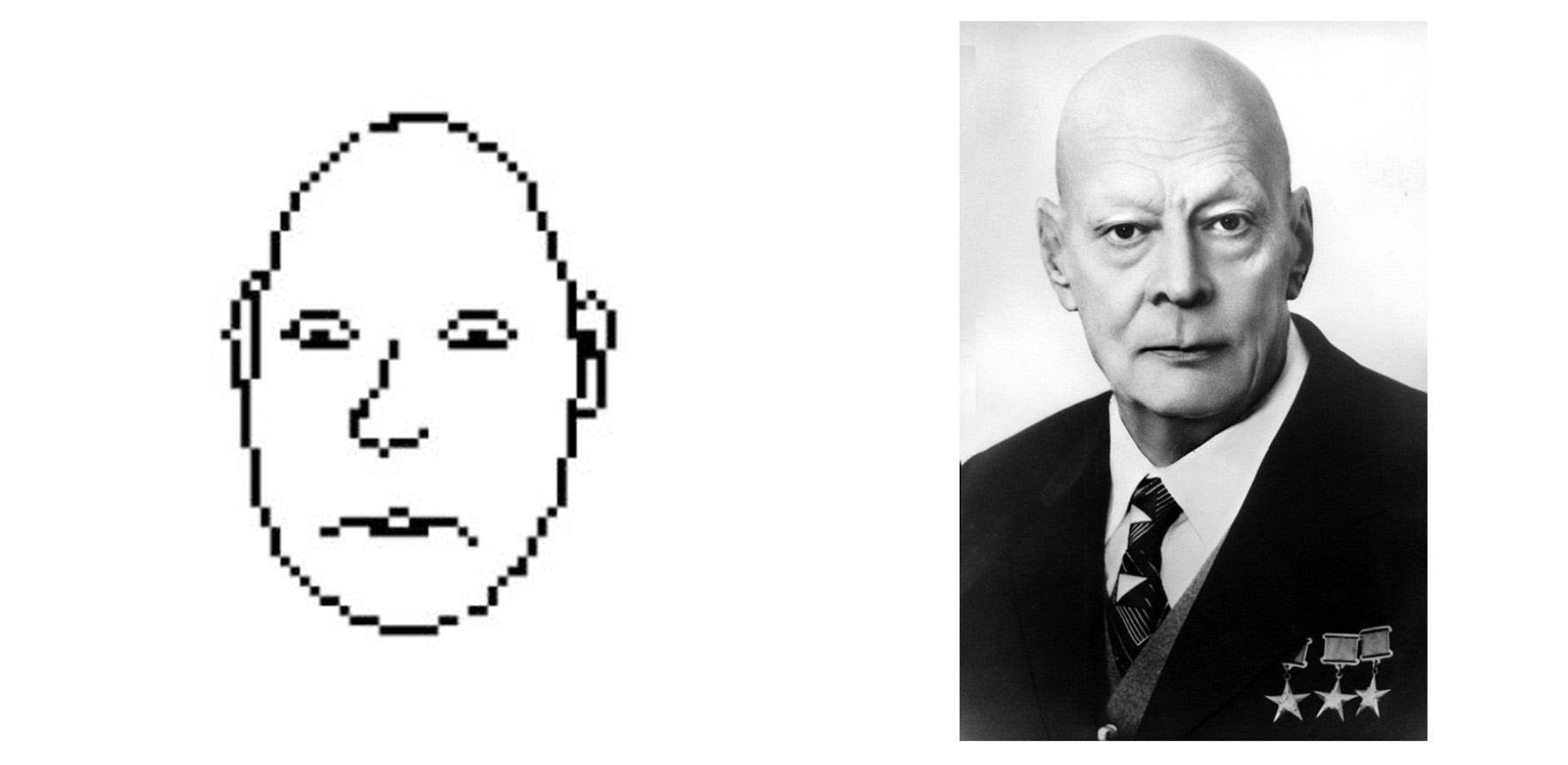
1983, the premises of the Council of Ministers (now it is the White House). An exhibition of educational equipment was held, it seems, it was called "Scientists of the Ministry of Higher Education in the country", something like that. One day I was on duty. I sat, with nothing to do, I painted on a screen with a resolution of 128 by 64 pixels, I drew such a face. And I hear whispering behind me. Before that, there were no people around, so I got distracted. I turn around - there is Academician Aleksandrov, President of the USSR Academy of Sciences, a man above the roof. Now you don’t know who the president of the Academy of Sciences is, and then she was very respected, and the president was a celestial person. And he says:
- Did you draw me?
- No, it happened.
- And what kind of thing is this?
I have told. He says - interesting, I want to know more about this.
Gennady Zelenko:
The next day, before I had time to come to work, they tell me - Alexandrov ordered you to come to him. And where to come, with whom to contact? Unknown I take a regular telephone directory, look for the Academy of Sciences, dial a number and say - Academician Alexandrov asked me to come. At that end, they clearly decided that another schizophrenic had appeared, and they hung up. After some time, I call again, again I begin to explain. The interlocutor was caught more intelligible, says - wait. After some time, a man arrives who manages everything, I also tell him a long time, he checks something, asks to call back. He speaks:- I understand everything, I order you a pass.
- But I alone cannot, I have a boss, a rector.
- Okay, I'll order him too.
We come to the Academy of Sciences. Now they have a huge building, and then it was a small one, in Neskuchny Garden. A very funny place: on the cabinets there are nameplates, but no posts, nothing. Just "Alexandrov A. P." We go in, there is a secretary:
- Where are you from?
- From MIEM.
- Ah, I bought a TV yesterday, it broke down with me! - and begins to attack our rector with questions.
Suddenly the door opens, Alexandrov appears. How was it arranged in the Soviet Union? On television, he was just like in the photo. But in reality he turned out to be a hunchback, of small stature: “Boys. Come on, come on ... ”He looks suspiciously at our rector.
He says - I have a daughter, I’ll call you in September, come, please, you need to teach her something. In the sense of programming.
We gave Alexandrov one of our computers, made on his knee. He became sympathetic, said - I was also a radio amateur. He had large bookcases, and somewhere at the very top was a binder of magazines. He says that my article is there for 29 years. In a conversation with him, I remembered the moment when radio receivers made in the form of a soap box began to be published in a magazine. He shrugs in response - he does not know what it is about. And then I understand that at the moment when I was interested in the receiver in the form of a soap box, he was making an atomic bomb.
Industrial Letters
A young Jura Ozerov appeared in our team, he decided to make the computer more compact. Using the available software, thereby the monitor and focusing on the Soviet element base, he minimized the number of necessary chips. Further, somewhere we got a printed circuit board, because we ourselves could not part so beautifully and well. Here is this:
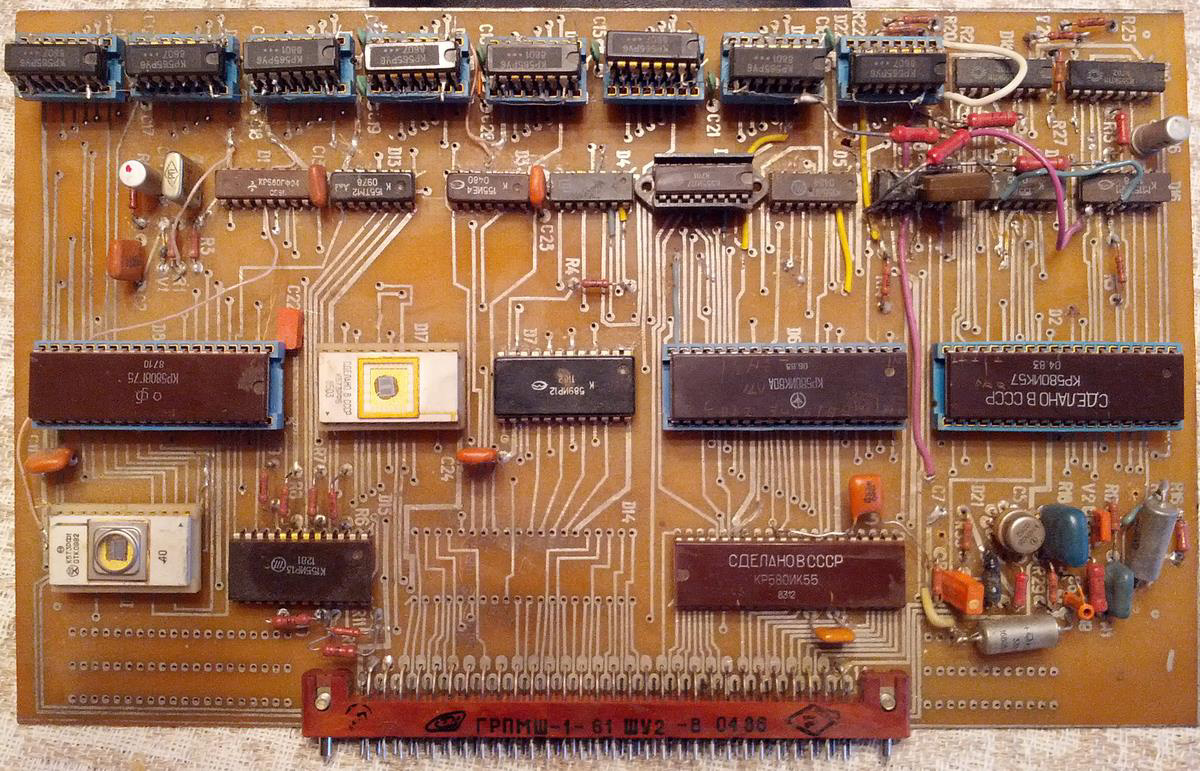
Microcomputer Radio 86RK, 1986 Photo: Audriusa, commons.wikimedia.org
This is a real working thing, which has been distributed in many thousands of copies. By the way, in addition to the Radio magazine, we gave a bunch of lectures, including in Fryazino, in the centers of the electronics industry, and tried to convey what the Intel 8080 is. That young KGB officer was very sorry that his superiors didn’t want to use this processor.
In response to our publications, readers sent a lot of letters. I still have them in a special bag, several thousand pieces. Letters came from all over the Soviet Union, from Poland, several times from Germany. Both private individuals and enterprise managers wrote. First, the envelopes came to the Radio magazine, and from there they were forwarded to my home address, it was so arranged. Each letter had a number.
Saved marriage
Sergey Popov:
Despite the fact that we asked not to give our addresses, the most persistent managed to recognize them. One evening a call rang in my apartment, I open it - a man stands with a suitcase, looks at me and says: "I divorced my wife." And the suitcase slowly pops into the doorway. “Who do you need?” Calls my name. “And how can I help you?” I thought he would answer: “I will live with you.” Says: "I'll tell you everything, just let it go."He went in, it turned out - really got divorced. The wife said - you will not see the child until he has a computer. He is a candidate of biological sciences, never held a soldering iron in his hands, but carefully did everything according to the instructions from the Radio magazine and brought in this suitcase: a computer, a small VL-100 TV and a tape recorder. I say - what does not work? I look, everything is in order. Answers - the tape recorder does not read or write a program. I look, he bought a new tape recorder, sealed. I say - let's open it. Opened, and there in the output connector not a single wire is soldered.
In general, it was repaired, and his family life began to improve. True, then the wife, as in Pushkin’s fairy tale, asked for something else ...
Exhibition in Leipzig
Gennady Zelenko:
In the eighties, a computer competition was held for the school. Vitya Panov, our third participant, says - micro- computer, sh . So it turned out "Mikrosh":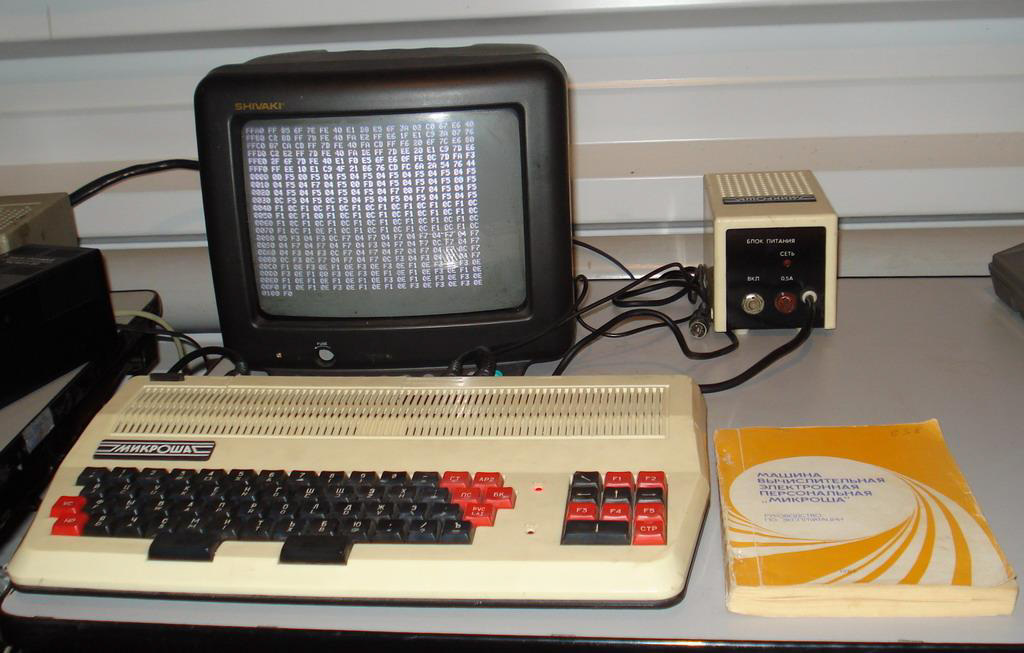
Photo: Alecv, commons.wikimedia.org
I was asked to introduce Mikrosha at an exhibition in Leipzig. The business trip promised to be long: the exhibition was held at the former tank factory, first several months installation, then two weeks - the exhibition itself, then some more time for dismantling. And none of the foreign trade workers wanted to go: "Oh, we don’t want to go to this Lipetsk." So they called Leipzig. Therefore, we, university workers, were put there. And I'm just glad - for a long time abroad, super.
The exhibition was dedicated to the Krasnoyarsk Territory. We arrived, everything was already hung there, a large text in German: “Krasnoyarsk. Lenin’s estate in such and such years. ” An interpreter from the Plekhanov Institute came with me. He looked at it, said - what did you write? Not an estate, but a village, of course. The nuances of the German language affected. They say to him - sit, not your business. “Well, I’ll sit here now, and how much will you sit next?” After these words, they rushed to call the embassy. And we interrupted this inscription all night.
A large machine for drilling printed circuit boards was placed next to our Mikrosha. We are from the university, and from Krasnoyarsk we sent some first secretary of the regional committee. Naturally, he did not understand the machine tools at all and could not tell the guests anything about them. Therefore, we had to quickly learn how these machines work, and already we showed them to the Germans. They said - interesting, good.
Suddenly a paper comes to us: in vain you are sitting here, you have to go to other pavilions, find out what's new with them, write down. Such a purely KGB paper. Well, let's go. We come to some German pavilion and see - there is exactly the same drilling machine. With us was a translator, Madame Komarova, who defended a thesis in Germany. She bought some kind of crazy cloak there. He approaches, examines the machine. All Germans fled - such a beautiful girl came. And suddenly she asks: “And what is the accuracy of double positioning?” Everyone ran away.
It was almost a year before perestroika, no one suspected what would happen. The Germans were interested in what the new Lada model would be. We had two types of brochures for the guests of the exhibition. One - with a speech by Gorbachev at the congress, the other - with space images. We thought that they would take pictures, but it turned out the other way around - the Germans were mainly interested in Gorbachev's speech. Apparently, they felt that something was going to happen.
Bucket of chips
Once, I don’t remember how, we got to the Lianozovsky Electromechanical Plant (formerly it was called "car building"). They made radars and something else - a purely military enterprise. We brought the director of the plant the Radio 86RK computer, one of the options. Oddly enough, we hacked him into the television in the director's office, and it worked. He scratched his head. And then there was the same trend as now: if there is a military-industrial enterprise, let it produce something for everyday life. He: "I will do it." We say so modestly - you see, this chip is not yet produced in the Soviet Union. And this one. He: “So what? I will buy a bucket of chips in the West and will do it. ” This is the decision of a normal leader. And the Lianozovsky plant began to produce Mikrosha.
Nineties
"Mikrosha" was produced not only in Lianozovo, but also at the Ulyanovsk radio tube plant. Something else was also produced there that served as the source of my future deeds in the 1990s.
At sunset, the average salary in the country was 160 rubles. The young specialist received 110, the leading engineer - 200, the assistant professor - almost 500. Having become an assistant professor, I received this money for about three months, and then a coup occurred. And that's it, I'm at zero. Then a certain Armenian by the name of Bapke contacts me. He says - could you make a slot machine? All this happens at the moment when they shot at the Vilnius TV Tower, 1991. You probably don’t know or don’t remember.
He says - let's go to Klaipeda , I will show what exactly needs to be done. I was scared, and he says: “Come on, let's go.” For some reason, I decided. We rushed off first by train to Riga, and then through the Baltic republics to Klaipeda.
He showed the slot machine, we agreed to start making them. And they bought a whole container of boards that were produced at the Ulyanovsk plant (in the 90s, no one wanted to take them anyway). The container reached Moscow, we rented an apartment and launched production of circuit boards there. It turned out a good toy, everything is as it should.
We made pretty decent money on this, we got money. He asked me: “How much have you been paid in this Radio magazine?” I shrug, say - so few that I don’t even know. “But now you’ll get everything from me!” He turned out to be right. Strange were the years.